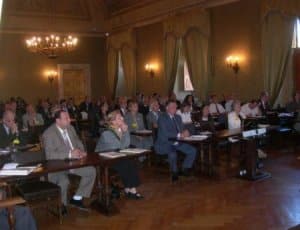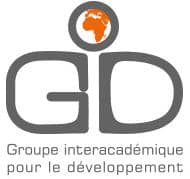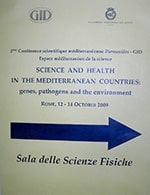Pr. André CApron
Président du GID

Your Excellencies, Ambassadors and Ministers,
Dear Colleagues and Friends,
It is indeed for me a great privilege for me to open the second international conference of the Interacademic Group for Development (GID), devoted to Science and Health in the Mediterranean regions : genes, pathogens and environment.
Before commenting the specific goals of this meeting, let met briefly summarize how the GID was born and what is its activities. Everybody will agree that beyond its specific and often spectacular progress, science has acquired two new dimensions during the 20th century, the confirmation of its fundamental roles in socio economical development and the building of knowledge based societies, from Dubai to Shanghai, from Pretoria to Tallinn, from Singapore to Bangalore, the travel relative between Science and Development have given to the « Golden Triangle » made by Education, Research and Innovation a particular strategic importance.
Secondly, the development of new relations between Science and Society, based on the increasing evidence that the share of knowledge and scientific development cannot rely anymore on « passive merchandising » practices but on appropriation strategies including socio-cultural specificities.
In this regard, beyond the universality of knowledge, integration of its regional dimensions is an essential condition of its appropriation and of its diffusion.
Resting on modern technologies and new tools of communication, these strategies aim at bringing together, with two common goals, progress of well-being and social integration, the worlds of education and science and community and family structures.
In this general context and in several countries (USA, UG, France, Italy), the role of Academies has appeared as an important element of animation and of coordinated interdisciplinary dimensions of the major challenges of development.
Warrant by essence of scientific excellence, natural crossroads of interdisciplinary dialogue, but also reflecting national and regional socio-cultural dimensions, Academies constitute privileged forums of interactions and exchanges between Science and Politics particularly at an international level, because of their political and economical independence, their autonomy and their legitimacy. In this regard, the emergence of the concept of « Diplomacy of influence » has contributed to make science an important stake of the political influence of many industrial countries.
At the same time, the increasing weight the major challenges of development (Agriculture, Food, Water, Health, Energy, Environment and so on) and the spectacular emergence of some essential priorities – pandemies (HIV,SARS, Swine Flu) food resources, energy and water resources have led to new integrative approaches of development strategies-making more than ever, an impervious necessity of interdisciplinary integrated science politics.
On these general grounds, in 2006 was born the project of the Interacademic Group for Development (GID). Initially constituted by a founding nucleus of the five national French Academies (Sciences, Medicine, Political Sciences, Agriculture and Technology), the GID was very soon joined by the Accademia Nationale dei Lincei, the Academy of Hassan II of Morocco, the Bibliotheca Alexandrina (Egypt) and the National Academy of Senegal.
19 Academies have now expressed their wish to be associated to this project and to join the Euro Mediterranean Academic Network created after a founding meeting in June 2008 in Paris, statutes of the network have been approved in December 2008 and the first general assembly in scheduled in June 2009 in Alexandria.
During the last 3 years, GID has initiated and developed 5 important activities.
- The International program devoted to Women Health Education (WHEP) through an interactive website (whep.info) which has received 120 000 visitors in the last 2 years and appears in developing countries (mainly sub-Saharan Africa) as an efficient tool for the promotion of women leadership in health.
- The Avicenne program dedicated to educational strategies integrated in their socio cultural context.
- A program « Science, Profession and Society » aiming though a series of dedicated seminars to promote scientific and technical excellence of managers of development.
- In 2007 taking into account the important participation of academies of Mediterranean region, GID has focused it action on the development of a Mediterranean Science Area and the creating of the Parmenides program.
Two major events have concretised the birth of this initiative, the creation of the EMAN network already mentioned and the organisation the first conference of the Parmenides program. This conference took place in June 2008 at Institut de France in Paris and has brought together more than 150 participants representing 23 Mediterranean countries and 17 Science Academies.
Three main workshops have been organised dealing with :
- Agriculture and sustainable development
- Halieutic resources and marine environment
- Impact of climate changes and adaptations.

The unanimously recognised success of this first conference has encouraged the organisation of the second GID conference which we are inaugurating to day and which is devoted to Science and Health in the Mediterranean region, will a special focus on genes-pathogens and environment. 3 main symposia will be dedicated to genetic diseases, Hereditary and environmental factors in chronic diseases, epidemiology of infections and emerging diseases. 3 round tables on these topics will allow for interactive discussions and elaboration of recommendations.
As you know, the Mediterranean Region, reputed over the world for its exemplary diet, is paradoxically the one of the region of the world with the highest increase of incidence of metabolic and cardiovascular diseases.




